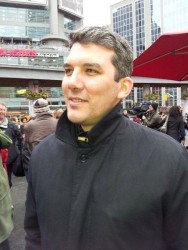Article Origin
Volume
Issue
Year
The 13-point declaration that ended Attawapiskat Chief Theresa Spence’s hunger strike on Jan. 24 is neither a way for her to save face nor an unrealistic set of goals.
“It’s an absolute victory,” said Danny Metatawabin, spokesperson for Spence.
Metatawabin helped draft the declaration, which he said was not prompted by pressure placed on Spence or Cross Lake First Nation Elder Raymond Robinson to end their hunger strikes. The declaration was signed by the Assembly of First Nations, federal New Democrats and Liberals, and the Native Women’s Association of Canada.
Metatawabin said Spence received full support across the country, including from the Attawapiskat First Nation, and brought international attention to the situation of First Nations people.
Spence was unable to attend the press conference that announced the end to her 44-day hunger strike as she had been admitted to hospital the previous night.
Robinson, who joined Spence at Victoria Island a day after she began fasting, told about his own experience at the hospital the night before. He said he was treated with such disrespect and condescension, he left without an examination.
“Where is my place in Canadian society? Why did I have to receive that kind of tone when I needed medical attention?” asked Robinson. The treatment he received underscored one of the reasons why he, Spence and Jean Sock undertook their hunger strikes.
“These are the things still plaguing us as First Nations people.”
Sock, from Elsipogtog First Nation, ended his hunger strike after 28 days, citing his mother’s ailing health as his reason
Robinson, who also agreed to the declaration, said he and Spence “quit on our own terms. We were happy with the result we made as a collective... Now we’re letting our leadership take over.”
Regional Chief Perry Bellegarde, who represented the Assembly of First Nations, said the declaration builds on the eight elements an AFN delegation presented to Prime Minister Stephen Harper at the Jan. 11 meeting. Neither Bellegarde nor Spence attended.
NWAC President Michelle Audet, who spent days with Spence during the chief’s hunger strike, said that while she respected Spence’s decision to boycott the Harper meeting, she had hoped Spence would attend and make her statement to Harper. But Spence refused to attend the meeting because the Governor General would not be there. Spence’s stand on the meeting influenced numerous chiefs to boycott as well.
Audet said the difference “a woman and two Elders managed to make … (is) so warm in our heart that there is hope.”
“The (declaration is) an expression of political will on our part and on the part of the AFN and on the part of the New Democratic Party and … on behalf of a lot of other Canadians. I think there are a lot of Canadians who want us to move forward,” said interim federal Liberal leader Bob Rae. He said his party will raise concerns in the House of Commons as well as engage broadly with Canadians. Romeo Saganash, representing the federal New Democrats, said his party will also bring forward initiatives in the House of Commons.
Neither of the political leaders believe the declaration will result in quick, wholesale changes – especially considering the Harper government has not signed it.
“These are things that are going to take time. These are things that are going to require work, said Rae, “but it is an absolutely realistic assessment of the steps that need to be taken in our lifetime if we are in fact going to achieve… reconciliation.”
Rae also noted that much of what the declaration called for, such as “free, prior and informed consent of First Nations where inherent and Treaty rights are affected or impacted,” was already supported by the Supreme Court of Canada.
“When there is political will to change things we can move pretty fast when it is necessary,” said Saganash.
That political will can be helped along by educating the general Canadian public about the conditions on First Nations reserves, as well as the challenges facing the environment with the passing of Bills C-38 and C-45, said Bellegarde.
“I think through all of this dialogue, this focus on treaty rights and inherent rights and Indigenous self-determination, people across Canada are opening their eyes,” he said. “There are things that can happen but it needs the political will and we’re going to have to drive that … not only Indigenous peoples but everybody in this land.”
He also pointed out that those changes are needed, especially if both federal and provincial governments want to move ahead with resource development.
“The land and the resources cannot be exploited anymore without the full inclusion and involvement of Indigenous peoples,” said Bellegarde.
Caption: Hayden King, Assistant Professor of Politics at Ryerson University and member of Beausoleil First Nation at Dundas Square Flash Mob Round Dance on January 11, 2011
Artist and political activist Wanda Nanibush is one of the organizers of the Idle No More Toronto teach-ins at Toronto Council Fire
- 13700 views


